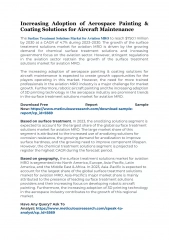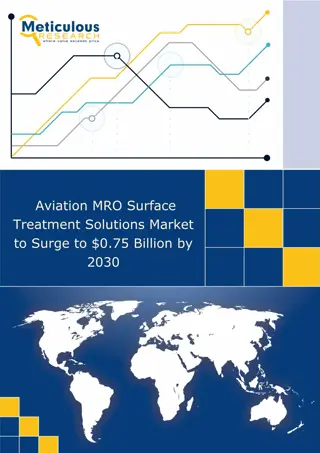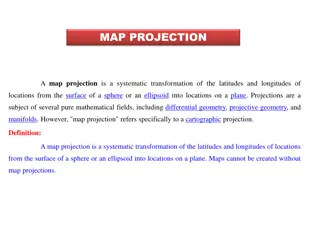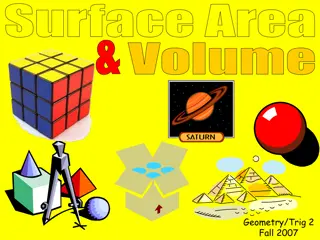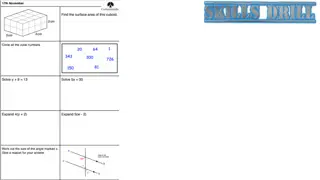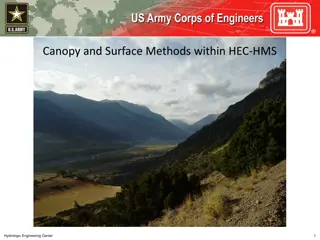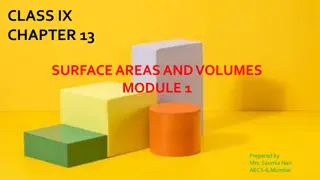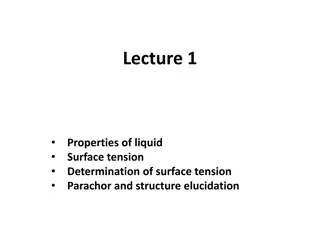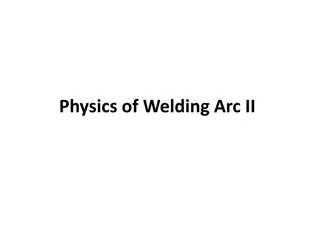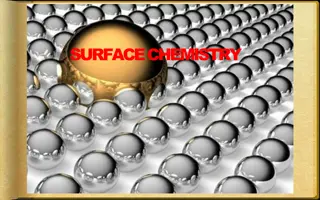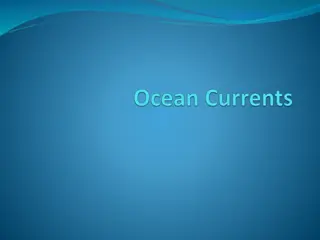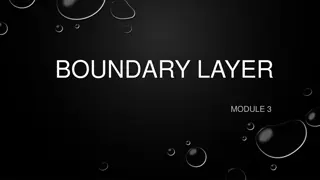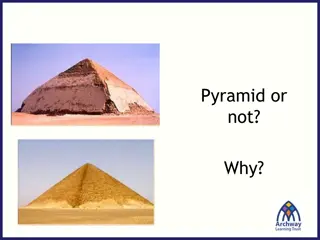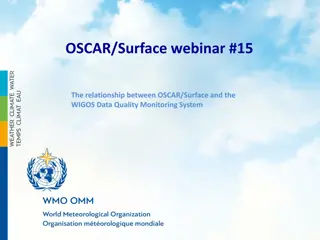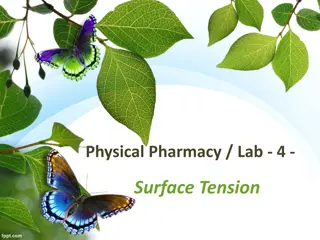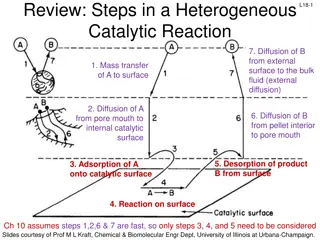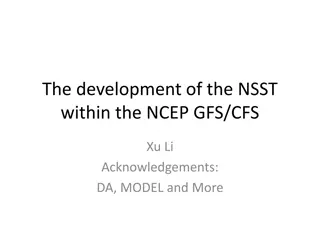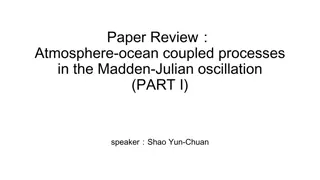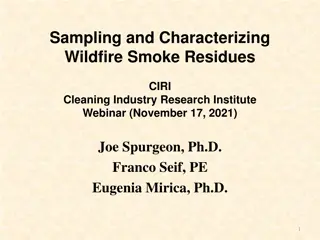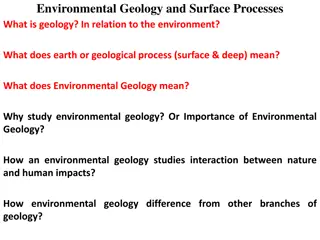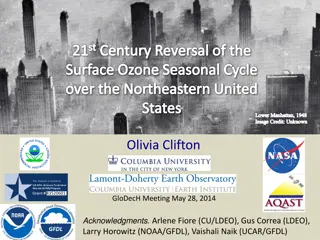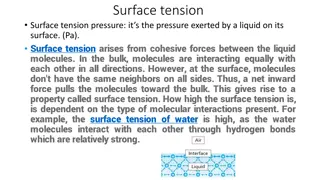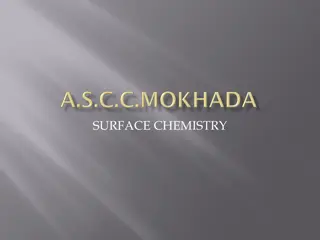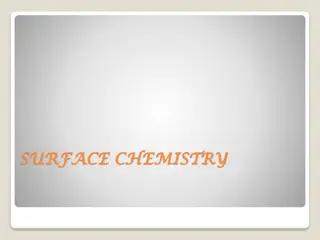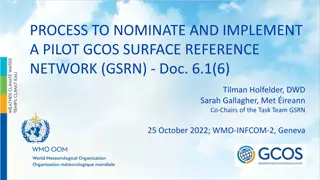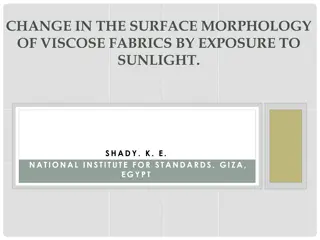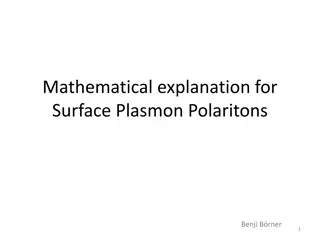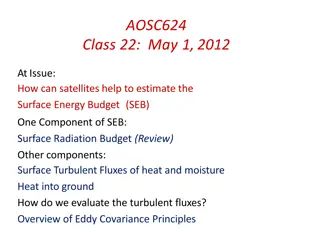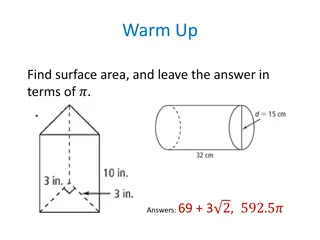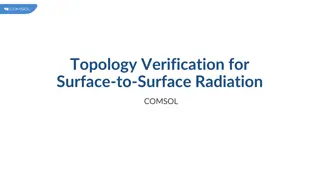Increasing Adoption of Aerospace Painting & Coating Solutions for Aircraft Maintenance
The Surface Treatment Solutions Market for Aviation MRO to reach $750.1 million by 2030 at a CAGR of 4.7% during 2023\u20132030. The growth of the surface treatment solutions market for aviation MRO is driven by the growing demand for chemical surface treatment solutions
1 views • 3 slides
Understanding Observed Changes in Atmospheric Solar Reflection and Surface Albedo
Exploring the attribution of changes in Earth's Albedo Shortwave Radiation (ASR) to various processes including atmospheric and surface contributions. The impacts of incident solar radiation, cloud reflection, absorption, and surface albedo are analyzed, along with the radiative sensitivity from iso
0 views • 12 slides
Understanding Earth's Interior through Seismic Waves: Part 1
Seismic waves provide crucial evidence about Earth's composition and structure. By analyzing the behavior of primary, secondary, and surface waves, scientists can determine the different layers and materials within the Earth. Primary waves travel through both solid and liquid parts, while secondary
9 views • 10 slides
Exploring Surface Tension and Wettability in Nature
Discover the fascinating world of surface tension and wettability through engaging experiments and observations, from water cohesion on a penny to the microscopic structures on lotus leaves. Delve into the role of cohesion and adhesion, surface wettability factors, and everyday applications of these
2 views • 17 slides
Understanding Surfaces and Interfacial Energy in Chemistry
Surfaces play a crucial role in free energy and dissolution processes, impacting surface tension and interfacial energy. Learn about the adsorption of molecules, surface excess properties, and the contributions of surface area and curvature to surface energy. Dive into concepts such as Laplace's equ
6 views • 71 slides
Aviation MRO Surface Treatment Solutions Market
Meticulous Research\u00ae\u2014a leading global market research company, published a research report titled, \u2018Aviation MRO Surface Treatment Solutions Market by Surface Treatment (Anodizing Solutions, Chemical Treatment Solutions, Plating Solutions, Coating & Painting Solutions, Non-Destructive
6 views • 3 slides
Aviation MRO Surface Treatment Solutions Market to Surge to $0.75 Billion by 203
Meticulous Research\u00ae\u2014a leading global market research company, published a research report titled, \n\u2018Aviation MRO Surface Treatment Solutions Market by Surface Treatment (Anodizing Solutions, Chemical\n Treatment Solutions, Plating Solutions, Coating & Painting Solutions, \nNon-Destr
0 views • 3 slides
Understanding Map Projections: Types and Applications
Map projection is a systematic transformation of latitudes and longitudes from a curved surface to a flat plane. There are various classifications based on construction methods, tangent surface position, view point of light, and qualities like equal area and equi-distance. Zenithal Polar Equidistanc
0 views • 9 slides
Understanding Surface Area and Volume in Geometry
Gain insights into calculating surface area and volume of geometric shapes, specifically focusing on rectangular prisms. Learn how to find surface area and lateral area using formulas, and explore examples illustrating these calculations step by step with images.
1 views • 57 slides
Learn About Surface Area of Pyramids and Cones
Explore lessons, videos, and resources to understand and calculate the surface area of pyramids and cones. Dive into informative content, watch helpful videos, access answer keys, and test your knowledge with a quiz provided by Hegarty Maths. Enhance your understanding of volume and surface area con
0 views • 11 slides
Understanding Canopy and Surface Methods in HEC-HMS
Explore the various canopy and surface methods utilized in HEC-HMS for managing water resources. Learn about canopy interception, evapotranspiration, common parameter values, and factors affecting losses. Delve into available methods, canopy storage values, and surface depression storage. Enhance yo
0 views • 12 slides
Understanding Solid Shapes: Surface Areas and Volumes Module
Explore the world of three-dimensional solid shapes, their components like faces, edges, and vertices, and the concept of surface area and volume. Dive into understanding solids made of polygons and those not made of polygons, along with the measurement units used for surface area and volume calcula
0 views • 8 slides
Understanding Properties of Liquids: Surface Tension & Capillary Action
Explore the properties of liquids, including surface tension and capillary action. Learn how liquids differ from solids and gases, the definition and measurement of surface tension, and the role of contact angle in capillary action.
0 views • 25 slides
Understanding Runoff in Surface Water Systems
Runoff, the flow of precipitation and other contributions in surface streams, plays a crucial role in watershed systems. It encompasses various sources such as surface runoff, interflow, and base flow. Surface runoff, which travels over the ground surface to channels, is influenced by factors like s
1 views • 27 slides
Understanding Arc Forces in Welding: Gravity and Surface Tension Forces
Explore the significance of arc forces in welding, focusing on gravity and surface tension forces. Learn how these forces impact metal transfer, deposition efficiency, and welding quality. Discover the role of gravitational force in detachment and transfer of molten metal, and how surface tension fo
2 views • 25 slides
Understanding Surface Chemistry and Adsorption Processes
Surface chemistry is the study of processes at the interface of two bulk phases, such as liquid-liquid interactions. Adsorption and absorption are key phenomena where atoms, ions, or molecules adhere to surfaces or enter bulk phases. The accumulation of molecular species at the surface, known as ads
1 views • 28 slides
Understanding Ocean Currents and Effects
Ocean currents play a crucial role in the movement of water across the Earth's surface. Wind-driven surface currents, influenced by the Coriolis effect, move water horizontally and impact climate patterns worldwide. Major currents extend deep below the surface and can move rapidly, while rip current
0 views • 14 slides
Understanding Primary Clarifiers and Surface Area Calculations
Learn about primary clarifiers used to remove particles in water treatment processes with different types and calculations. Dive into surface area calculations for rectangles, including converting inches to feet for accurate measurements. Practice solving surface area problems for practical applicat
7 views • 21 slides
Exploring Surface Area in Mathematics
Delve into the concept of surface area as an essential mathematical topic, understanding its significance in everyday life and its application in various 3D shapes. Learn how to calculate surface area for different space figures like prisms and pyramids through step-by-step methods. Engage with esse
6 views • 21 slides
Understanding Boundary Layer and Drag Forces in Fluid Dynamics
Boundary layer module explains the presence of viscous forces near a surface due to fluid flow, leading to laminar or turbulent boundary layers. Flow separation occurs when a boundary layer detaches from a surface, impacting lift and drag forces. Adverse pressure gradients and flow separation phenom
0 views • 19 slides
Exploring Pyramid Geometry for Surface Area Calculations
Delve into the concept of surface area calculations for pyramids, ranging from identifying fake pyramids to determining the surface area of iconic structures like the Great Pyramid. Learn about the essential information needed, such as base length and slant height, to derive accurate measurements. D
0 views • 32 slides
Understanding the Relationship Between OSCAR/Surface and WIGOS Data Quality Monitoring System
The WIGOS Data Quality Monitoring System (WDQMS) is an integral part of ensuring availability, quality, and timeliness of WIGOS component observing systems. Operational since March 2020, WDQMS monitors surface and upper-air stations by variables such as temperature, pressure, wind, and precipitation
0 views • 10 slides
Understanding Surface Tension in Physical Pharmacy Lab
Surface tension is a crucial concept in physical pharmacy lab dealing with gas-solid or gas-liquid interfaces. It refers to the force per unit length required to balance the inward pull on the surface. Interfacial tension, cohesive forces, and adhesive forces play significant roles in determining su
0 views • 16 slides
Introduction to Integer, Char, and Float Data Types
This content introduces the fundamental data types in programming - Integer, Char, and Float. It includes binary representations, images, and related slides. Explore the characteristics and usage of these data types in programming.
1 views • 9 slides
Understanding Heterogeneous Catalytic Reactions: Key Steps Explained
In a heterogeneous catalytic reaction, various important steps occur, including diffusion of reactants, adsorption onto the catalyst surface, surface reactions, and desorption of products. Different mechanisms like single-site, dual-site, and Eley-Rideal mechanisms are involved in the surface reacti
0 views • 17 slides
Understanding Near-Surface Sea Temperature Development in NCEP GFS/CFS
This informative piece delves into the evolution of Near-Surface Sea Temperature (NSST) within the NCEP GFS/CFS, discussing its significance in Numerical Weather Prediction (NWP) systems, the utilization of sea surface temperature (SST), and the T-profile near the sea surface. It covers the role of
0 views • 28 slides
Understanding Atmosphere-Ocean Coupling in Madden-Julian Oscillation
Atmosphere-ocean coupled processes in the Madden-Julian Oscillation (MJO) play a crucial role in intraseasonal oscillations. This paper review by Shao Yun-Chuan explores how the ocean's Sea Surface Temperature (SST) influences surface fluxes, MJO convection, and energy balance dynamics. It delves in
0 views • 17 slides
Comparison of Wet-Wipe and Tape Lift Methods for Sampling Wildfire Smoke Residues
This research study compared the performance of wet-wipe and tape lift sampling methods for evaluating the impact of surface char from wildfire smoke residues. The study involved sampling 48 houses in Southern California affected by different wildfires, utilizing side-by-side replicate samples colle
0 views • 56 slides
Understanding Environmental Geology and Surface Processes
Geology in relation to the environment involves studying Earth's geological processes, both surface and deep, and their impacts on nature and human activities. Environmental geology focuses on the interaction between humans and the Earth's near-surface environment, addressing hazards like erosion, f
0 views • 71 slides
Surface Ozone Seasonal Cycle Reversal Study in Northeastern United States Lower Manhattan
Study on the reversal of the surface ozone seasonal cycle over Northeastern United States Lower Manhattan, analyzing the impact of NOx and VOC emissions on Surface O3 levels. Research shows a 26% decrease in regional NOx emissions leading to changes in the seasonal cycle of surface ozone concentrati
0 views • 24 slides
Understanding Surface Tension in Physical Pharmacy Lab
Surface tension is a critical aspect in physical pharmacy lab experiments, involving the study of forces at gas-solid or gas-liquid interfaces. It is the force per unit length required to counterbalance the net inward pull on a surface. The concept extends to interfacial tension, cohesive and adhesi
0 views • 21 slides
Understanding Surface Tension: Properties, Measurement Methods, and Calculations
Surface tension is the pressure exerted by a liquid on its surface due to cohesive forces among molecules. The measurement methods include the liquid rise in a capillary tube technique, drop weight method, and bubble pressure method. The surface tension coefficient can be calculated using the equati
0 views • 12 slides
Understanding Surface Chemistry and Adsorption Phenomena
Surface chemistry is a crucial branch of chemistry that focuses on the chemical processes occurring at interfaces between different surfaces like solid-liquid, solid-gas, and liquid-gas. This field plays a significant role in various industries, including electronics. Adsorption, absorption, and sor
0 views • 15 slides
Understanding Surface Chemistry and Adsorption Phenomenon
Surface chemistry explores the interactions that occur at surfaces and interfaces, with adsorption being a key phenomenon. Adsorption involves the concentration of molecules on a surface, with adsorbents and adsorbates playing crucial roles. Desorption, the opposite process, removes adsorbed substan
1 views • 21 slides
Establishment of GCOS Surface Reference Network (GSRN) Pilot Phase
The establishment of the GCOS Surface Reference Network (GSRN) Pilot Phase aims to improve the accuracy, stability, and comparability of surface observations for Essential Climate Variables (ECVs). The GSRN will serve as the reference network for surface observations, providing data traceability and
0 views • 7 slides
Changes in Viscose Fabric Surface Morphology Due to Sunlight Exposure
This study explores the impact of sunlight exposure on the surface morphology of viscose fabrics. Direct exposure to sunlight for 120 days during summer showed significant changes in fiber surface depressions. The observed damage in mechanical properties correlated with alterations in surface morpho
0 views • 11 slides
Mathematical Insights into Surface Plasmon Polaritons
This mathematical explanation delves into the intricacies of surface plasmon polaritons, covering Maxwell's equations, wavenumbers, bulk and surface plasmon-polariton formulations, medium considerations, excitation conditions, losses, and matching examples with air, gold, and sapphire prisms. Detail
0 views • 13 slides
Satellite Applications in Estimating Earth's Surface Energy Budget
Satellites play a crucial role in estimating the Surface Energy Budget (SEB) by providing data on various components such as Surface Radiation Budget and Surface Turbulent Fluxes. The SEB includes factors like net radiation flux, sensible and latent heat fluxes, and subsurface heat transfer. Satelli
0 views • 38 slides
Geometry Concepts for Surface Area Calculations
Explore various geometric shapes such as pyramids and cones to calculate surface area. Learn the differences between prisms and pyramids, understand the importance of altitude and slant height in pyramids, and differentiate between lateral and surface areas. Practice finding lateral and surface area
0 views • 16 slides
Surface-to-Surface Radiation Verification and Boundary Detection in COMSOL
Explore the verification of surface-to-surface radiation setups in COMSOL, detecting incorrect radiation configurations with nonradiating boundaries. Learn how to identify and resolve nonradiating boundaries, ensuring accurate and effective radiation simulations. Discover the importance of selecting
0 views • 10 slides
